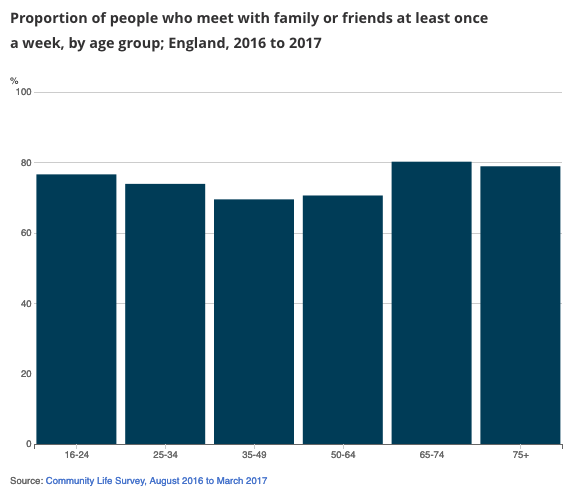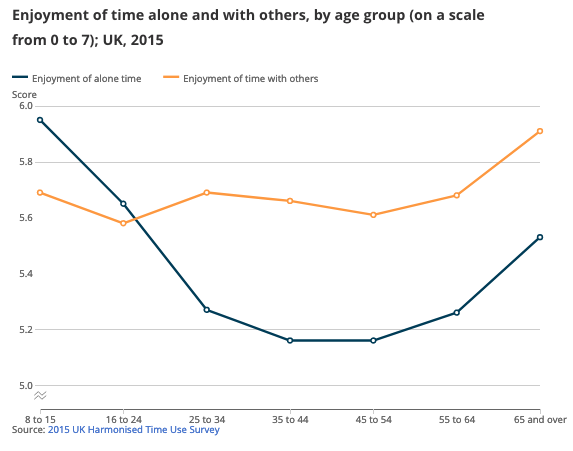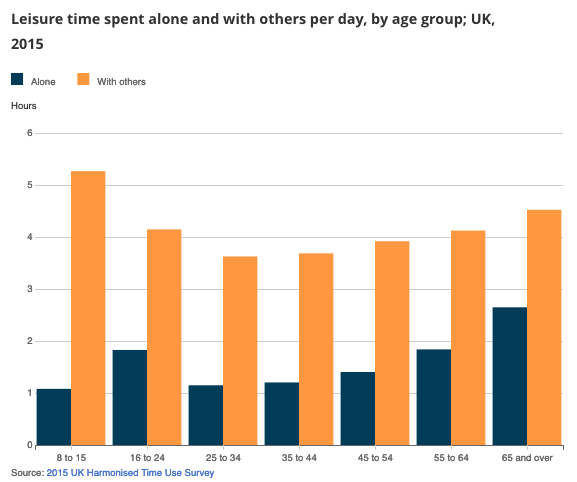If I had to guess, I bet that when children leave the home, partner time spend becomes more bimodal, with people who like their partners spending more time together, and people who were mostly co-parents with their partners spending less time together. This could net out to making it look like there's not that much change.
- People are at a relationship-time-steady-state between about thirty and sixty. I imagine that many people start relationships in that time, so does that mean that they also stop them at about the same rate, or gradually reduce time with their partners at a rate matching others’ forming of new relationships? Are people radically less likely to start relationships after about thirty?
I would wager that it's the last one. New relationship formation goes way down after the 20s, meaning that from the 30s thru the 60s people are mostly maintaining existing relationships, and the new relationships that they do form are being matched approximately by the ones that die out.
Is this a problem? I'm not sure. It does suggest that you should be serious and intentional about your relationship choices when you're in your 20s, because the people you build community with in that period will be the greater part of your relationships that you have for your entire life. Personally, nearing the age of 40, I find that this is mostly correct. The relative strength of various relationships has waxed and waned over time, but I have trouble thinking of too many people I know now that I did not know already in my 20s.
I think I fixed the graph. Not actually sure why it broke, but crossposting sometimes runs into weird problems.
Young people of the same age are relatively similar to each other. Their life experience is mostly being someone's kids, and attending school. Their desires are to explore things, and discover their own limits. They also often see each other as potential partners. They often have a lot of free time.
The flip side is that a small absolute difference of age can make a huge difference. For kids, plus or minus three years is like a different species.
Older people are more specialized. They have different professions, different family situations. And less free time, because they have their jobs, partners, kids. They are less flexible, because they had decades to find their personal preferences and build their habits (both good and bad). This all makes socializing harder.
The absolute age differences matter much less; a 40 years old can easily have a conversation with a 30 years old, or a 50 years old. The more salient difference is the job and family situation: two adults having the same kind of job and kids of similar age will have many topics in common, regardless of the age difference between them. Two adults of the same age, one with family and kids, and the other single, are like different species.
On a meta level, the older you get, the more insight you have into the things I described here. Young people underestimate how much their social circle is shaped by attending the same school, and how easily it can fall apart then the school is over. Older people, interacting with their colleagues, are often aware that they are only one job interview away from starting anew; but they don't have much time to interact with their non-job friends.
(Not sure how much of what I described here is true generally, and how much I just generalized from 1 example.)



Striking things about the figure below, which I got from Our World in Data, on time use:
In other news, Our World In Data seems awesome.
I’m guessing that this means ‘any children’ rather than ‘their own children’, because the rate for 15 year olds seems high ↩